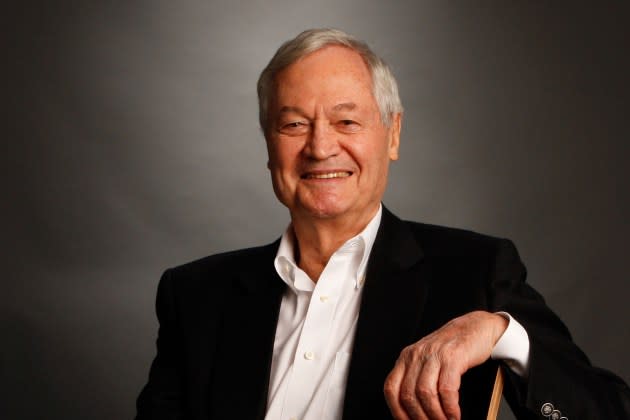Roger Corman, Trailblazing B-Movie Director and Producer, Dead at 98
- Oops!Something went wrong.Please try again later.
- Oops!Something went wrong.Please try again later.
- Oops!Something went wrong.Please try again later.
- Oops!Something went wrong.Please try again later.
- Oops!Something went wrong.Please try again later.

Roger Corman, who directed and produced countless B-movies and championed future industry stalwarts Martin Scorsese, Robert De Niro, and Jack Nicholson, died at his home in Santa Monica, California on May 9, Variety reports. He was 98.
“His films were revolutionary and iconoclastic, and captured the spirit of an age. When asked how he would like to be remembered, he said, ‘I was a filmmaker, just that,’” the family said in a statement to the outlet.
More from Rolling Stone
David Sanborn, Jazz Saxophonist Who Played on David Bowie's 'Young Americans,' Dead at 78
To B or Not to B? Why Roger Corman Was One of the Most Influential Figures in Movie History
Dennis Thompson, MC5 Drummer and Last Surviving Original Member, Dead at 75
For nearly five decades, he dominated the B-movie market, with films that ranged from his early work in the Fifties, which included Westerns, such as Five Guns West and The Gunslinger to horror and sci-fi, including The Day the World Ended and The Undead, to teen flicks like Carnival Rock and Rock All Night.
His 1958 picture Machine-Gun Kelly signified a turning point in his being critically recognized. He followed that up with I Mobster and then 1960’s The Little Shop of Horrors.
He often worked with Sam Arkoff of American Intl. Pictures, who financed most of his early work. Together, they worked on a series of horror films focusing on Edgar Allan Poe, including 1960’s The Fall of the House of Usher and several low budget hits like The Tomb of Legeia and The Masque of Red Death. These films brought renewed attention to actors such as Boris Karloff, Vincent Price, Basil Rathbone and Peter Lorre.
It was around this time that he began to work with then-unknowns such as Ellen Burstyn, Nicholson, and De Niro, as well as screenwriters including Robert Towne, and directors who would eventually become household names, such as Scorsese, Jonathan Demme, Joe Dante, Ron Howard and Peter Bogdanovich.
Howard wrote on social media, “RIP Roger Corman. A great movie maker and mentor. When I was 23 he gave me my 1st shot at directing. He launched many careers & quietly lead our industry in important ways. He remained sharp, interested and active even at 98. Grateful to have known him.”
Nicholson in particular was indebted to Corman as he spent the first decade of his career under his tutelage: The future Oscar winner and mega-star made his acting debut in Corman’s 1958 teen exploitation film The Cry Baby Killer, and soon after appeared in the director’s The Little Shop of Horrors, The Raven, The Terror, and The St. Valentine’s Day Massacre. Corman also served as director on Nicholson’s screenplay for the 1967 acid-soaked counterculture classic The Trip. “He was my life blood,” an emotional Nicholson said in the documentary Corman’s World.
Demme, who got his start behind the camera on Corman-produced films like Caged Heat, Crazy Mama, and Fighting Mad in the mid-Seventies, would go on to win a Best Director Oscar for 1992’s The Silence of the Lambs; in that Best Picture-winning film, Demme cast his mentor Corman in the brief role of an FBI director:
Corman was a one-man film school for many of Hollywood’s greatest directors, giving them a hands-on education on the art of filmmaking: The sound man on Corman’s 1963 sports drama The Young Racers would next direct the Corman-produced horror movie Dementia 13 that same year. A decade later, that same filmmaker — Frances Ford Coppola — would win Best Picture for his movie The Godfather. (Corman would later cameo as a senator in The Godfather Part II.)
Titanic and Avatar director James Cameron had a similar origin story, first working as a special effects and art director on Corman’s B-movies before embarking on his own box office-shattering and Oscar-winning career. A half-decade after Scorsese’s 1967 debut Who’s That Knocking at My Door?, it was Corman who revived his career when he chose Scorsese to direct 1972’s Boxcar Bertha; Scorsese’s breakthrough Mean Streets arrived the following year. “Roger was, to me, one of the most important American filmmakers,” Scorsese once said. “I think it’s very important to let the generation of today know who he is.”
In 2009, after a half-century of being eschewed by industry honors, Corman’s legacy was finally recognized with an honorary Academy Award for his life’s achievements. He produced more than 300 films, and directed over 50 titles, from 1955’s Five Guns West to 1990’s Frankenstein Unbound.
“Roger Corman, one of the most influential movie directors in my life, has passed away. It was my privilege to know him,” Halloween filmmaker John Carpenter wrote on social media. “He was a great friend. He shaped my childhood with science fiction movies and Edgar Allen Poe epics. I’ll miss you, Roger.”
Best of Rolling Stone
